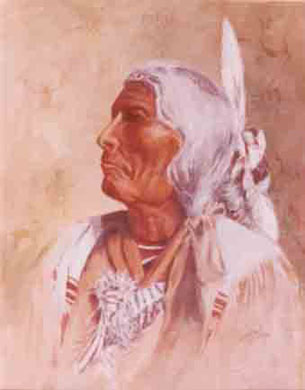I watched several documentary episodes today. I finished the We Shall Remain PBS documentary about Native Americans and their struggle against homeland aggression from settlers. The faces in Carola's paintings have always haunted me, and this documentary tells the story very deeply. It is deplorable what our government did to the native people of this land for so many years. Next I watched another American Experience documentary, FDR. Franklin Roosevelt. I grew up just a few miles from his estate in Hyde Park, New York. I've seen his home in Warm Springs, Georgia also. As a "traitor to his class" of privilege and inherited wealth , he did whatever he could to help turn around the nation during the depression. Bringing electricity to rural areas was something I learned about in Warm Springs.
After watching this, I went running in Freedom Park, and bought my "Gimme Green" rice shake at Sevananda. I also stopped into the Native American store in Little Five Points and spoke with one of the workers there for a little while. He is one-quarter Sioux. He gave me a lot of things to think about the history of Native Americans. There are maps of different tribes and peoples on the walls in the store, and many books, music cds, jewelry, news paper articles, bumper stickers, T-Shirts. One of the most fitting is below which reads "Homeland Security -- Fighting Terrorism Since 1492"
What a thought-provoking perspective on things, isn't it?
While jogging I was also listening to the audio course "The American Mind". I listened to the first 6 lectures so far, which discuss The Enlightenment and the Great Awakenings and Jonathan Edwards' influence. It's fascinating to understand the founding of Harvard and Yale, among others, as competing institutions born out of essentially religiously-derived differences that stretch back into the "old world".
This is the course description:
Americans pride themselves on being doers rather than thinkers. Ideas are naturally suspect to such a people. But ideas are at the root of what it means to be American, and today’s habits of thought practiced by citizens throughout the United States are the lineal descendants of a powerful body of ideas that traces back to the first European settlers and that was enriched by later generations of American thinkers.
You can see the entire list of lectures at the link above.
Behind this nation’s diverse views on religion, education, social equality, democracy, and other vital issues is a long-running intellectual debate about the right ordering of the human, natural, and divine worlds.
In their own times such great thinkers as Jonathan Edwards, Thomas Jefferson, Abraham Lincoln, William James, Martin Luther King, Jr., and many others engaged in lively and often contentious debate that helped mold America’s institutions and attitudes. Their approach was frequently honed by ideas from abroad—from Locke, Hume, Kant, Darwin, Marx, Freud, and Gandhi, among others.
I'm just now getting into the section where the discussion of Locke and his theory of property is being covered in lecture 6. As I listened to this, I thought back to the Native American treatment and the contrasting views of nature, God, ownership, and reality that came crashing into each other when settlers (invaders from the perspective of the Native Americans) attempted to forcibly convert natives to Christianity, take their land away and push them further and further away into reservations, and ultimately to destroy their culture. In my readings of the Christian Gospels, I can say this is not something Christ would have done. Unless you're one of those people who likes to drag out verses about "bringing a sword", then you'll find it hard to justify such brutality within the words of Christ. It is for reasons like these that I cannot take seriously claims of people to be "on God's side" when a blind eye is turned to injustice like what was done to Native Americans.
The subject of the painting below, one painted by my great-grandmother Carola, is a human being, one with unalienable rights, as in:
"We hold these truths to be self-evident, that all men are created equal, that they are endowed by their Creator with certain unalienable Rights, that among these are Life, Liberty and the pursuit of Happiness."Thank you very much, Mr. Hobbes, Mr. Locke, Mr. Paine, and also Mr. Jefferson. Yet, when human beings are viewed from a distance, through the lens of nothing more than problem, profit or plunder, then certainly we will see exterminations and cleansing such as what took place over a span of hundreds of years in the Americas to its native people, via the slave trade, or what happened in Nazi Germany to Jewish people and other non-Aryan peoples.
Aristotle wrote:
“The aim of art is not to represent the outward appearance of things, but their inward significance”.This is the art of dignity, an inner quality of a human being viewed as such.





























No comments:
Post a Comment